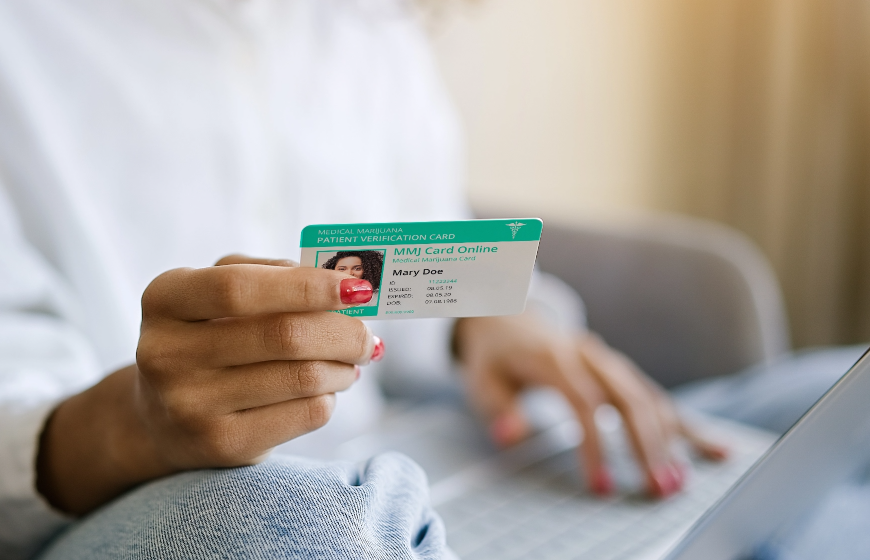How Do I Get a Wisconsin Medical Marijuana Card?

Find a Licensed Physician
If Wisconsin ever legalizes MMJ, it must create a Medical Marijuana Regulatory Commission (MMRC) to oversee the program. Patients would apply to this entity that would decide whether or not to applications are approved.
Had SB 1034 passed into law, it would have allowed advanced practice nurses, physician assistants and doctors to provide certification. It also stated that a solid doctor-patient relationship would need to be in place.

Schedule a Consultation
The next step is to book an appointment once you find a doctor. In other states, such consultations tend to last around 15 minutes. The process involves the doctor reviewing the patient’s medical records and performing a physical exam. The physician tries to determine if the patient is eligible for MMJ and whether the substance would prove useful. If they think medical marijuana could help a patient, they would provide written certification.

Complete Your Application Online
According to SB 1034, patients must complete the rest of their medical marijuana application within 30 days of getting their physician’s certification. Although the legislation didn’t specify, it seems probable that patients would be able to apply online.
Once the MMRC approves an application, patients receive their MMJ cards in the mail. At this stage, you would legally be allowed to buy medical marijuana in Wisconsin.
How to Apply for a Medical Marijuana Card in Wisconsin
- A Step-by-Step Guide
- Locate a suitable licensed medical professional
- Schedule an appointment
- Chat with the doctor about your use of MMJ
- Upon receiving your written certification, complete your application
- If approved, wait for your MMJ card to arrive in the mail
- Buy medical marijuana
Wisconsin Medical Marijuana Card Qualifying Conditions
If the state ever legalized MMJ, it would almost certainly follow the rules of other state programs. This means you would need to meet the following criteria to be deemed eligible:
- Aged 18+
- A resident of Wisconsin
- Have a qualifying medical condition
Patient Qualifying Conditions
SB 1034 had relatively few qualifying conditions:
- PTSD
- ALS
- Glaucoma
- Multiple sclerosis
- HIV/AIDS
- Crohn’s disease
- Seizure disorders
- Cancer
However, it is possible that if Wisconsin legalized MMJ, it would have a completely different set of qualifying conditions.
General Guidelines
The situation surrounding MMJ in Wisconsin is far from clear. There is a suggestion that lawmakers may create a restrictive medical marijuana program. However, there is no defined timeframe as to when this might happen. As a result, we can only provide the relatively little information we have to hand.
Medical Marijuana Card Renewal in Wisconsin
There’s every indication that a medical marijuana card in WI would be valid for one year. The most likely scenario is that patients would need to get a new written certification and fill out a renewal application online.
Caregiver Rules
Senate Bill 1034 included provisions for caregivers, stating that applicants must be aged 21+ and have no previous convictions for drug-related offenses. Also, an MMJ patient could only choose one caregiver.
A Brief History of Cannabis in Wisconsin
Although Wisconsin was once among the nation’s biggest hemp producers, it has never had a close relationship with marijuana. Various attempts to legalize MMJ failed. One of the first pieces of legislation to make it into law was Lydia’s Law in 2014. However, all attempts at marijuana legalization have floundered, including reforms in 2013, 2015, 2017, and 2019.
A Senate Committee held a hearing on SB 1034 in 2022, but it met the same fate as every other piece of marijuana-related legislation. There is a belief that Wisconsin may ultimately create a highly restrictive MMJ program, but we don’t know when.
Wisconsin Medical Marijuana Laws and Rules
Wisconsin has not decriminalized marijuana, so possessing any amount comes with a possible six-month prison term. If you commit a second offense, it is classified as a felony and could see you spend up to 3.5 years in jail.
It is a similar punishment for selling or cultivating any amount of marijuana. Wisconsin has among the strictest cannabis penalties in the United States and desperately needs a medical marijuana program to protect MMJ users. First, however, it must implement decriminalization.
What Types of Cannabis Products Can I Purchase in WI?
Even if Wisconsin legalized MMJ, it would probably not allow the use of marijuana flower. Instead, patients could access topicals, tinctures, capsules, and oils.
How Much Cannabis Can I Buy & Possess?
According to SB 1034, MMJ patients would be permitted to possess up to a 30-day supply. However, it did not outline any possible limits or whether the doctor would determine what a 30-day supply means.
Where Can I LEGALLY Purchase MMJ in Wisconsin?
It is impossible to say how many dispensaries would be in WI if the state ever allowed medical marijuana.
Can I Take My MMJ to a Different State?
No. Regardless of whether you live in a location with legal marijuana or not, it remains illegal to bring marijuana across state lines. It is unknown whether any Wisconsin MMJ program would include reciprocity with other states.
Can I Cultivate Medical Marijuana in Wisconsin?
No MMJ proposal in Wisconsin allows patients to grow marijuana at home.
FAQ About Getting an MMJ Card in Wisconsin
There is no indication of how long it would take the MMRC to approve applications.
If you live in a state where our providers offer their services, you receive a full refund if the physician doesn’t give you written certification. If MMJ ever comes to Wisconsin and our providers support patients from the state, there’s every chance this money-back guarantee would hold.
There is no information on how much an MMJ card would cost in the state. The application fee would likely be no more than $100, based on other programs. You could also expect to pay at least $200 for the consultation.
Any Wisconsin medical marijuana program would likely allow minors to apply. However, they would need the permission of a parent or legal guardian. This individual would also be the patient’s caregiver.